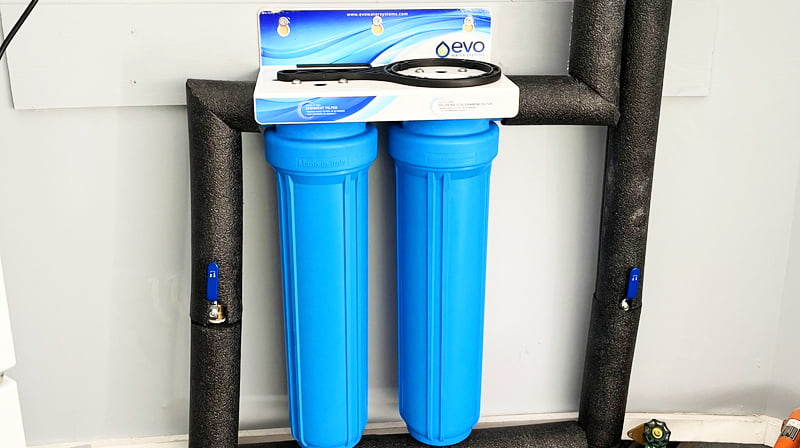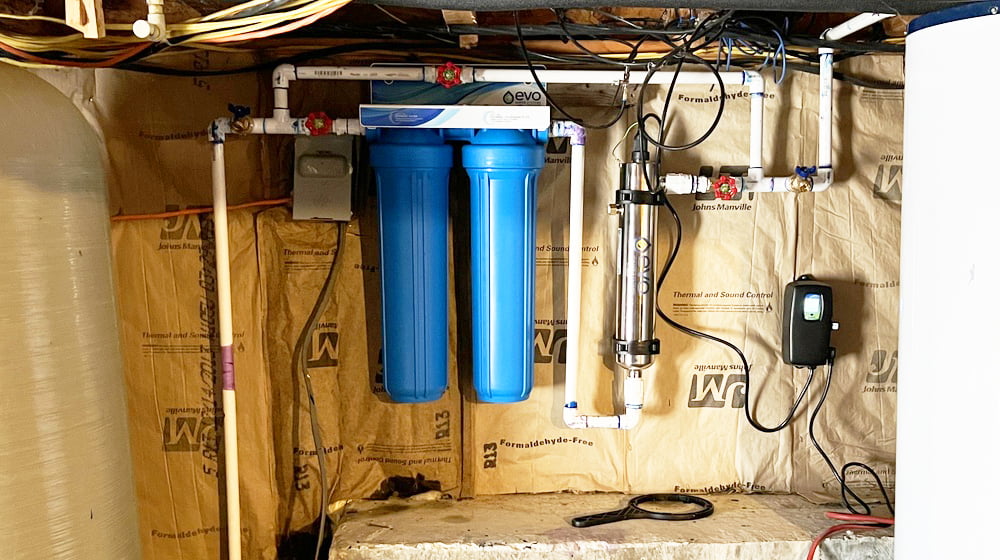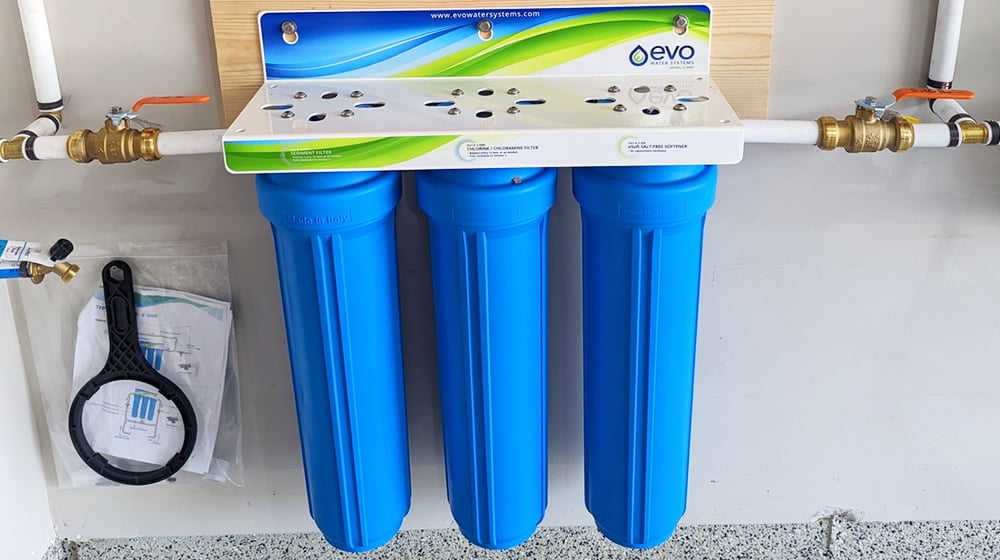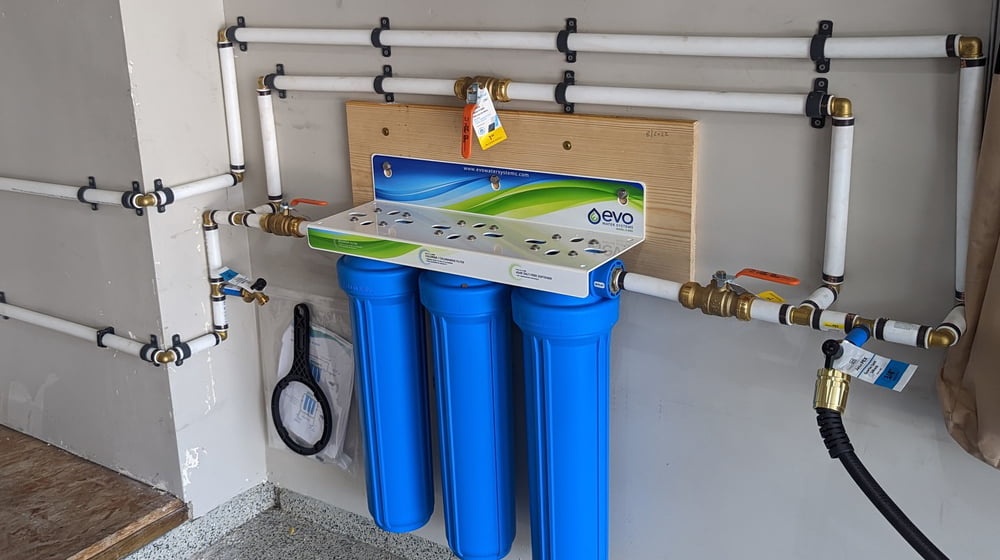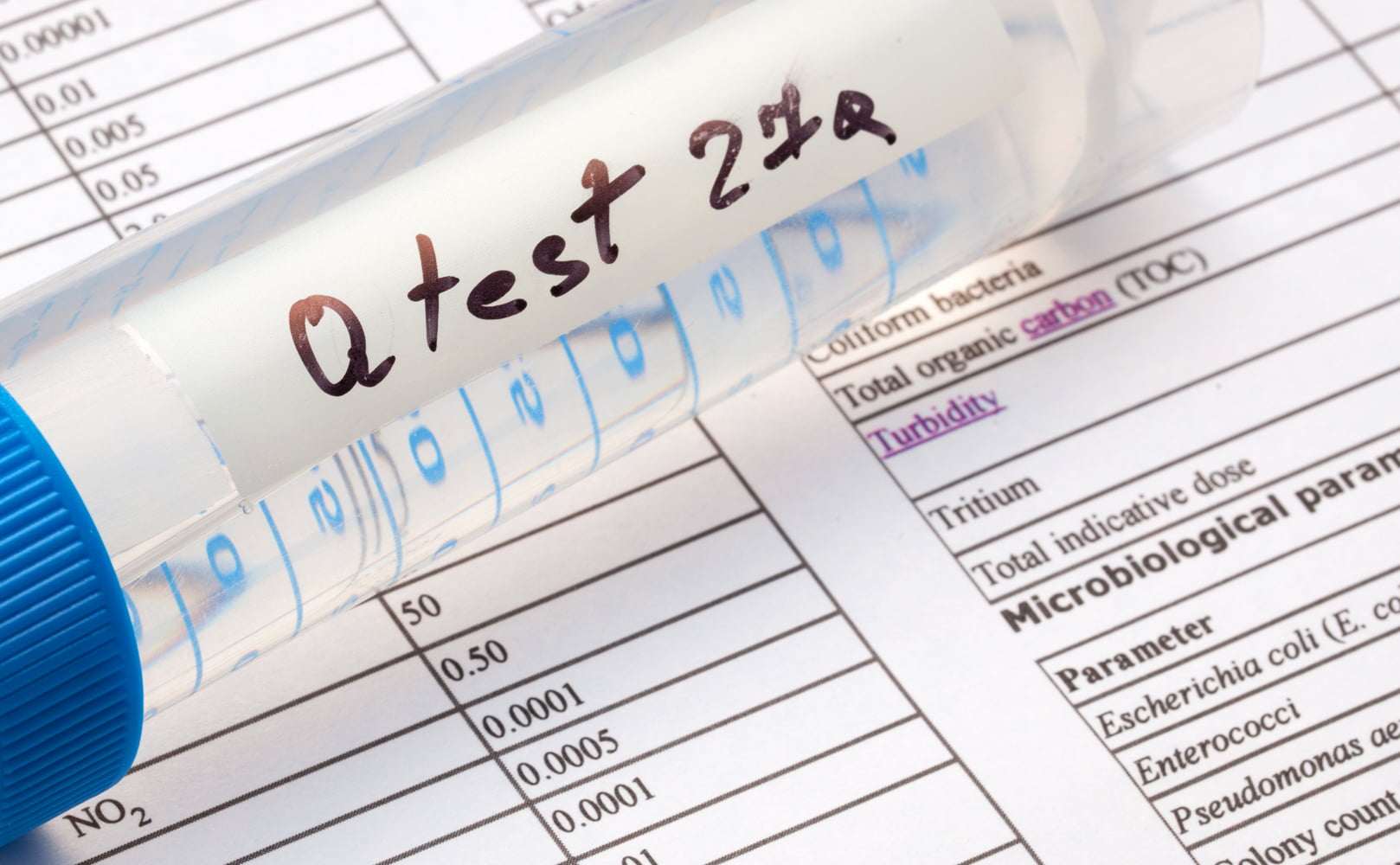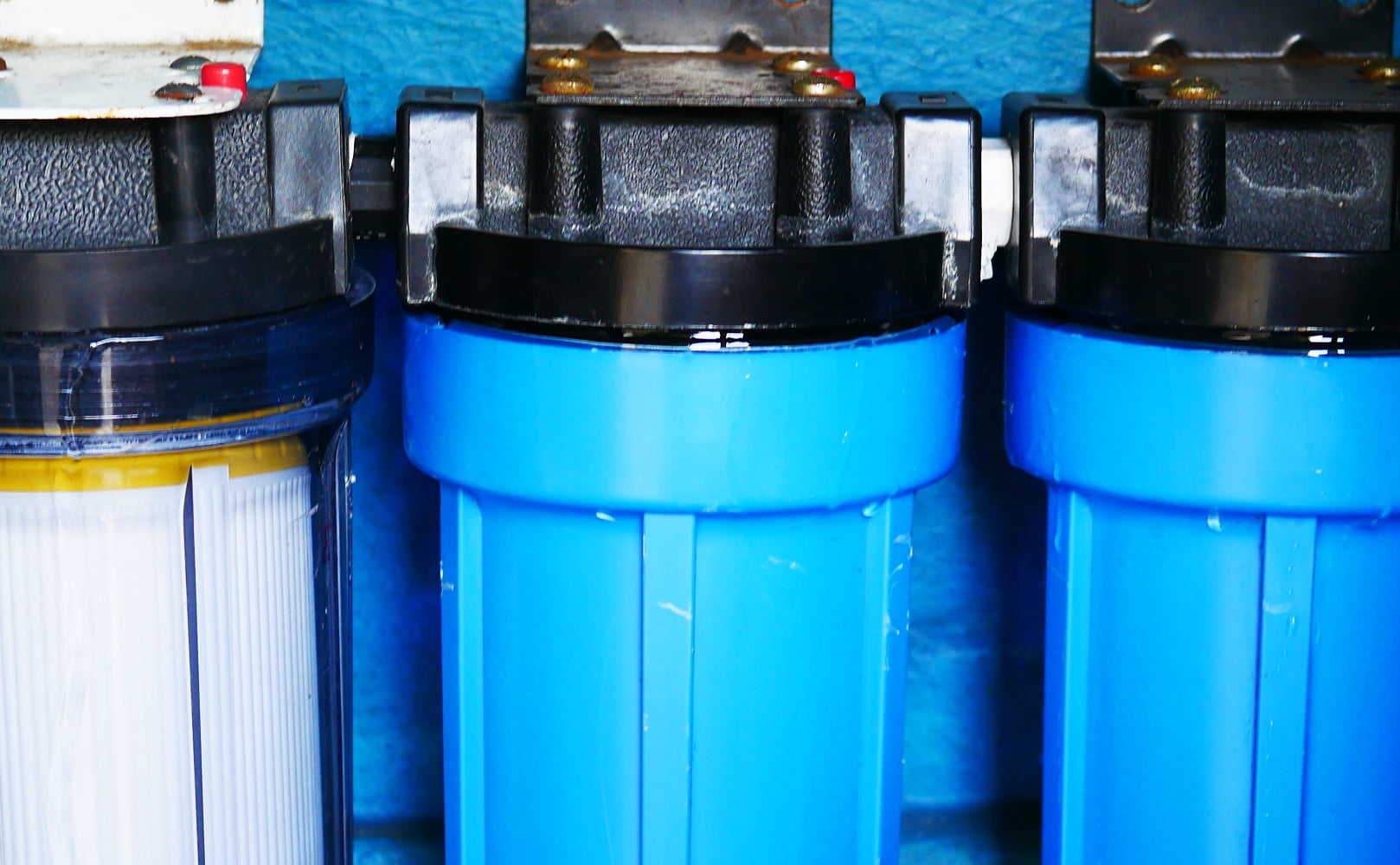7 Best 2 and 3-Stage Whole House Water Filters (*Update 2024)
Written by: Gene Fitzgerald // Expert Fact-Checking: Buddhini Dolapihilla, MBSS // Last Updated: Jan 31, 2024
This page may contain affiliate links. If you buy a product or service through such a link we earn a commission at no extra cost to you. Learn more.
Top Pick: What’s the Best 2-Stage and 3-Stage Whole House Water Filter?
The best 2-stage whole house water filter in 2024 is the Kind E-1000. It protects your family and home from harmful contaminants. It further improves water taste and odor, is easy to install and maintain, fast (15 gpm), and backed by a satisfaction guarantee and lifetime warranty.
The best 3-stage whole house water filter is the Kind E-3000, which is identical to the E-1000 only that it uses a third filter stage reducing hard water scaling.
Whole house water filters with 2 or 3 filter stages offer a wide range of options for your filtration needs. With so many choices available, finding the perfect system can be a challenge. That’s why we’ve invested extensive time and effort into reviewing over 26 top systems on the market and included their best ones in this buying guide.
Our goal is to provide you with all the information you need to make an informed buying decision and choose the right 2 or 3-stage whole house water filter for your home. Let’s go!
No Time to Read? Check Our List of the Best 2 and Best 3-Stage Whole House Water Filters!
| Product | Details | |
|---|---|---|
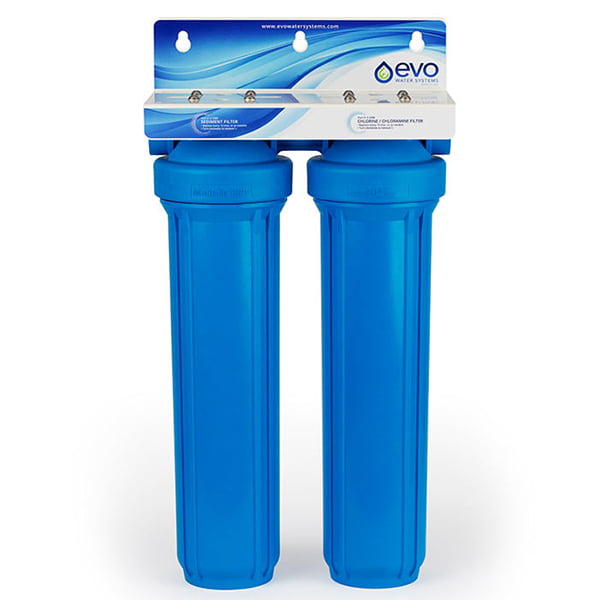 Best 2-Stage (for City Water): Kind E-1000 |
Overall Rating: 4.5/5.0 ⓘRatings based on effectiveness of filtration, flow rates, service life, our testing, user ratings, customer service, product warranty, cost, and other factors.
Get 5% Off! Use Code: |
Price: $$ Type: Sediment Filter + Catalytic Carbon Flow Rate: 15 gpm Filter Life: 1 Year Annual Cost: ~$145 Read Review: Click Mike’s Video Review: Click |
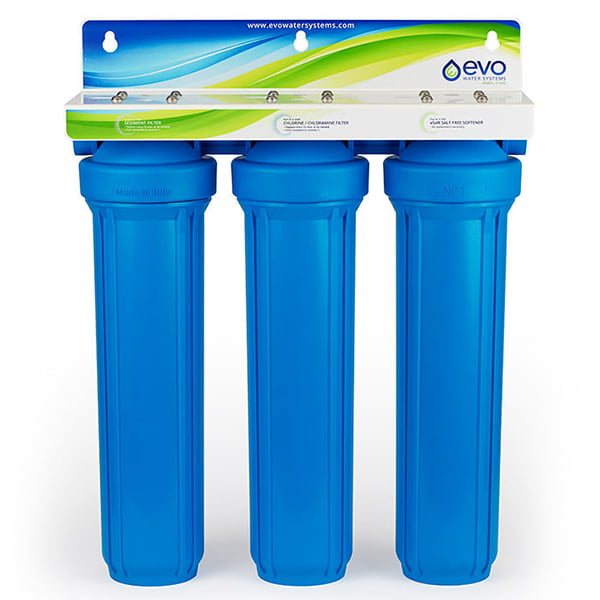 Best 3-Stage (for Hard City Water): Kind E-3000 |
Overall Rating: 5.0/5.0 ⓘRatings based on effectiveness of filtration, flow rates, service life, our testing, user ratings, customer service, product warranty, cost, and other factors.
Get 5% Off! Use Code: |
Price: $$$ Type: Sediment + Catalytic Carbon + TAC Flow Rate: 15 gpm Filter Life: 1 Year Annual Cost: ~$145 Read Review: Click |
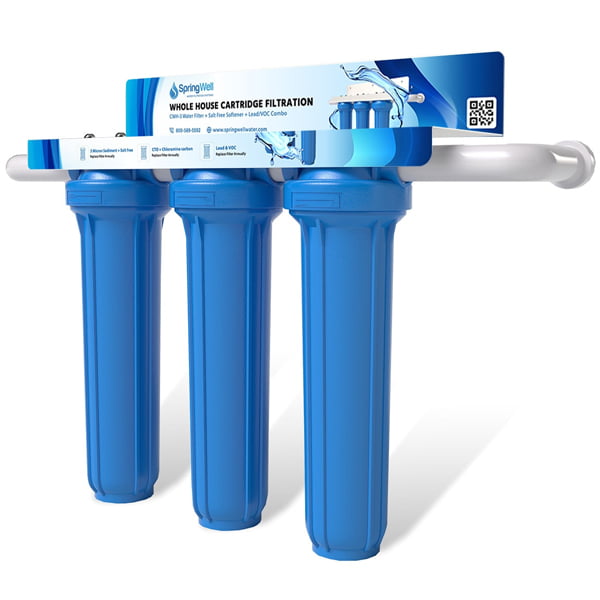 Best for Lead: SpringWell CWH-3 3-Stage |
Overall Rating: 4.0/5.0 ⓘRatings based on effectiveness of filtration, flow rates, service life, our testing, user ratings, customer service, product warranty, cost, and other factors.
Get 5% Off! Use Code: |
Price: $$ Type: Sediment + Activated Carbon + Submicron Flow Rate: 20 gpm Filter Life: 1 Year Annual Cost: $350 Read Review: Click |
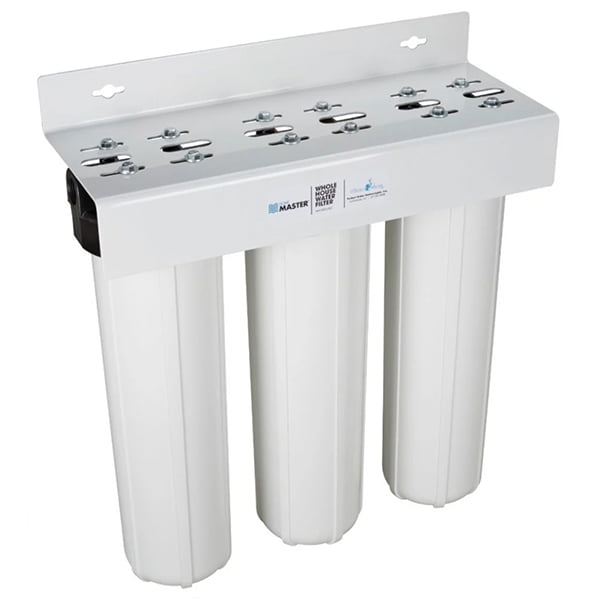 Best for Well Water with Iron: Home Master HMF3SdgFeC |
Overall Rating: 4.5/5.0 ⓘRatings based on effectiveness of filtration, flow rates, service life, our testing, user ratings, customer service, product warranty, cost, and other factors.
Get Free Shipping! Use Code: |
Price: $ Type: Sediment + Iron Filter + GAC Flow Rate: 15 gpm Filter Life: 6-12 Months Annual Cost: $260+ Read Review: Click |
 Best for Chromium 6 + Arsenic 5: USWS Purely EZ |
Overall Rating: 4.0/5.0 ⓘRatings based on effectiveness of filtration, flow rates, service life, our testing, user ratings, customer service, product warranty, cost, and other factors.
Get 5% Off! Use Code: |
Price: $ Type: Sediment + Carbon Flow Rate: 15 gpm Filter Life: 6-12 Months Annual Cost: ~$320 Read Review: Click |
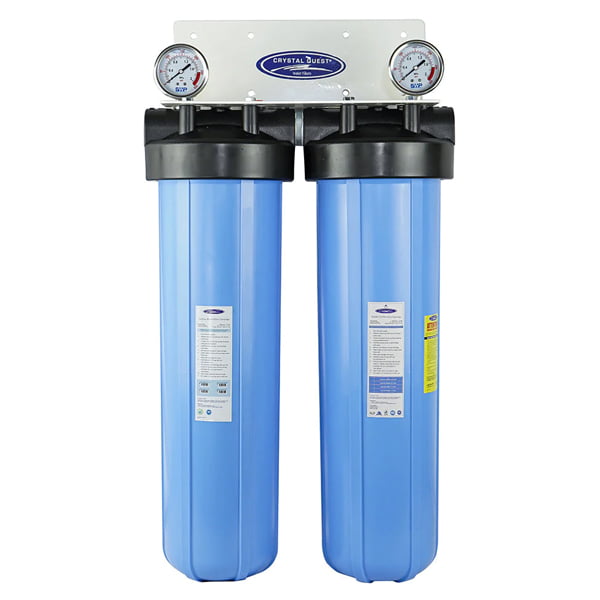 Best for Fluoride: Crystal Quest Big Blue |
Overall Rating: 4.0/5.0 ⓘRatings based on effectiveness of filtration, flow rates, service life, our testing, user ratings, customer service, product warranty, cost, and other factors.
Get 5% Off! Use Code: |
Price: $$ Type: Bone Char + Mixed Media Bed Flow Rate: 4-6 gpm Filter Life: $300+ Annual Cost: 1-2 Years Read Review: Click |
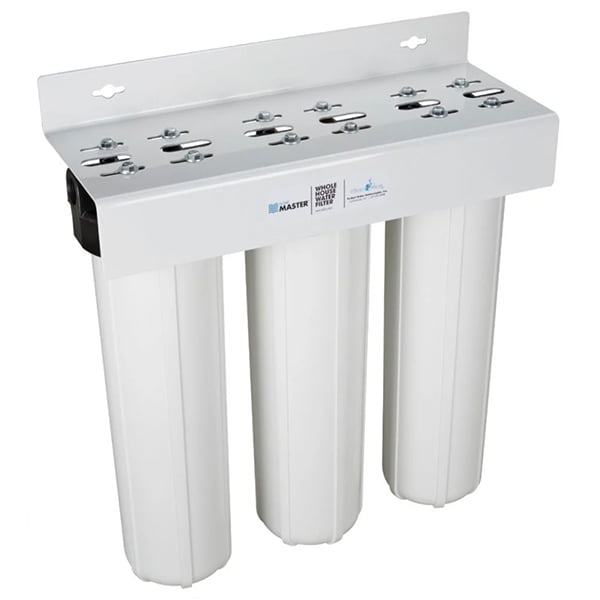 Best for Sediment: Home Master |
Overall Rating: 5.0/5.0 ⓘRatings based on effectiveness of filtration, flow rates, service life, our testing, user ratings, customer service, product warranty, cost, and other factors.
Get Free Shipping! Use Code: |
Price: $ Type: Sediment Filters Flow Rate: Up to 20 gpm Filter Life: ~$100-300 Annual Cost: Up to 1 Year Read Review: Click |
2 and 3-Stage Whole House Water Filter Reviews
Our Top Picks
- Kind E-1000 – Best for Tap Water with Chlorine/Chloramine
- Kind E-3000 – Best for Hard City Water with Chlorine/Chloramine
- SpringWell CWH-3 – Best for Lead
- Home Master HMF3SdgFeC – Best for Well Water w/ Iron
- USWS Purely EZ – Best for Chromium + Arsenic
- Crystal Quest Big Blue – Best for Fluoride
- Custom Home Master – Best for Sediment
1. Best for Tap Water with Chlorine/Chloramine: Kind E-1000 2-Stage Whole House Water Filtration System
In our opinion, the overall best 2-stage whole house water filter in 2024 is the Kind Water Systems E-1000. It’s ideal for filtration of water with chemicals including chlorine and chloramine, pesticides, VOCs, PFAS – you name it!
Mike’s Video Review
Mike, one of our inhouse video content creators, has ordered, plumbed in, and tested the Kind E-1000 whole house filter in his new home – including a water quality analysis for contaminant reduction rates. 100% hands-on experience! Mike has documented the entire process and shares his findings in the video below:
Other Specs
- Model: E-1000
- Last Price: $776.12
- Filter Stages: 2
- WxHxD: 15½”x29″x8″
- Water Temperature: 36-120 °F
- Water Pressure: 25-120 psi
- Fitting: 1″ FNPT
- Warranty: Limited Lifetime
Key Features & Pros
- Made in the USA.
- The 2-stage whole house filter uses both a 5-micron sediment filter and a catalytic activated carbon block filter to remove a wide arrange of contaminant particles.
- First, the 5-micron pleated sediment filter eliminates dirt, clay, sand, and other debris. This not only protects the later carbon stage from clogging but also extends the life of your household appliances.
- Next, the catalytic activated coconut shell carbon block filter removes or reduces chlorine/chloramine – which can give your water an off taste and odor. It will also target pesticides, herbicides, VOCs, industrial solvents, THMs, HHAs, so-called “forever chemicals” (PFAS), and many more common contaminants.
- The system features an impressive 15-gallon per minute flow rate – enough to accommodate large homes with up to 6 bathrooms.
- Installing this 2-stage whole house water filter is a breeze.
- Both the sediment and carbon filter must be replaced every 12 months, so overall there isn’t much maintenance required. Swapping filter cartridges takes just 10 minutes and doesn’t require any special tools except a filter wrench.
- The replacement filters are standard-sized (20” x 4.5”) – so you could purchase off-brand filters as replacements if you wish.
- Both filter replacements cost $145 annually – or roughly $125 if you sign up for autoship.
- 4-month satisfaction guarantee or your money back.
- Limited lifetime warranty on the entire system.
- Quick shipping and excellent customer support.
Cons
- No built-in bypass comes with the kit.
Our Rating
- Filtration Performance: 5.0/5.0
- Filter Life: 4.0/5.0
- Price: 4.0/5.0
- Maintenance Cost: 5.0/5.0
- Overall: 4.5/5.0
Best for
The Kind -1000 is best for anyone looking for a cartridge-based 2-stage whole house filter system for municipal water with chlorine or chloramine.
2. Best for Hard City Water: Kind Water Systems E-3000 3-Stage Filter and Salt-Free Water Softener
Got hard city water? Check out the E-3000 by Kind Water Systems! For that purpose, it’s the best 3-stage whole house water filter in 2024.
Gallery
Other Specs
- Model: E-3000
- Last Price: $1,698.30
- Filter Stages: 3
- Max Hardness: 75 gpg
- WxHxD: 23¼”x29″x8″
- Water Temperature: 36-120 °F
- Water Pressure: 25-120 psi
- Water pH: 6.5-9.5
- Fitting: 1″ FNPT
- Warranty: Limited Lifetime
Key Features & Pros
- Manufactured in the USA.
- A 5-micron pleated sediment filter removes large particles like silt, sand, clay, and rust. This crucial first stage protects both the later filter stages as well as your household appliances from dirt.
- Next, a catalytic activated carbon block is used to eliminate chlorine and chloramine in addition to a wide range of other contaminants like VOCs, pesticides, PFAS, and HAAs. This creates ultra-clean tap water without any foul taste or odor.
- Lastly, Kind’s eSoft saltless water conditioning cartridge neutralizes hard water scaling using a process called Template Assisted Crystallization (TAC). This process is salt-free and will eliminate future scale buildup and also reduce existing limescale over time.
- This stage is virtually maintenance-free and doesn’t require regeneration.
- The maximum allowable water hardness level is 75 gpg.
- The system flow rate is 15 gallons per minute – which is enough to provide water for up to 6 bathrooms.
- Installation is simple, with only two plumbing connection hookups required.
- Low maintenance. Only annual filter replacements of the first two stages are required.
- The yearly filter change cost is just $145 – or around $125 if you sign up for autoship.
- 120-day money-back satisfaction guarantee.
- Limited lifetime warranty on the entire system.
- Quick shipping and top-notch customer service.
Cons
- Doesn’t include a bypass valve.
- Water can’t contain iron or hydrogen sulfide for the system to operate.
Our Rating
- Filtration Performance: 5.0/5.0
- Filter Life: 4.5/5.0
- Price: 4.0/5.0
- Maintenance Cost: 5.0/5.0
- Overall: 5.0/5.0
Best for
The system is best for anyone looking for a whole house water filter and softener combination for municipal water.
3. Best for Lead: SpringWell CWH-3 Whole House Cartridge System
SpringWell’s CWH-3 Whole House Cartridge System has 3 filter stages. One is used to remove lead. The other filter stages eliminate chlorine, chloramine, disinfection byproducts, PFAS, pesticides, bad taste and odor, and other stuff commonly found in tap water.
Other Specs
- Model: CWH-3
- Last Price: $1,055.96
- Filter Stages: 3
- Width: 24”
- Height: 30″
- Water Temperature: 36-120 °F
- Water Pressure: 42-120 psi
- Water pH: 6.5-10
- Fitting: 1″
- Warranty: Limited Lifetime
Key Features & Pros
- The first stage is a 5-micron sediment pre-filter with a core filled with water conditioning filter media. It traps particulate matter – think sand, silt, and other dirt – while reducing hard water scaling + existing buildup in appliances and pipes.
- Next comes activated carbon to remove chlorine taste and odor, chloramine, HAAs, PFAS, pesticides, herbicides, etc.
- Greatly improves how your water tastes and smells.
- The VOC/lead filter cartridge uses submicron filtration for lead removal. VOCs and other organic compounds will be removes as well.
- Flow rate is 20 gallons per minute which is plenty of water even for large homes.
- There are 2 other system variations:
- CWH-1 – combines 5-micron sediment filtration (stage 1) with carbon filter media (stage 2). Flow rate is 20 gpm.
- CWH-2 – 5-micron sediment filter + salt-free water conditioning (stage 1) with activated carbon filtration (stage 2). Flow rate is 16 gpm.
- Filter cartridges are rated at 12 months when used on water with up to 15 gpg hardness.
- SpringWell gives you a 6-month risk-free satisfaction guarantee.
- Lifetime warranty on filter housings and valves.
Cons
- Maintaining the CWH-3 costs $350 per year. That’s the combined price for the replacement filters.
Our Rating
- Filtration Performance: 4.5/5.0
- Filter Life: 4.0/5.0
- Price: 4.5/5.0
- Maintenance Cost: 4.0/5.0
- Overall: 4.0/5.0
Best for
The SpringWell CWH-3 3-stage whole house water filter is best for tap water contaminated with lead.
4. Best for Well Water with Iron: Home Master HMF3SdgFeC 3-Stage Whole House Water Filter
If you have iron, manganese, and/or sulfur in your water, we recommend the Home Master HMF3SdgFeC 3-Stage.
Other Specs
- Model: HMF3SdgFeC
- Last Price: $579.00
- Filter Stages: 3
- WxHxD: 24″x25″x9″
- Water Temperature: 40-100 °F
- Water Pressure: 20-90 psi
- Water pH: Ideally >7.0
- Fitting: 1″
- Warranty: 2 Years
Key Features & Pros
- The whole house filtration system is tailor-made for homes supplied with well water.
- The first filter stage is a multigradient polypropylene sediment filter. It features a 25-micron surface, a 10-micron inner layer, a 5-micron inner layer, and a 1-micron core. This stage will remove silt, sand, and sediments to protect the later filter cartridges from clogging.
- Next is a radial-flow iron reduction filter that reduces both ferrous and ferric iron in water up to 3 parts per million.
- Keep in mind that the presence of hydrogen sulfide and manganese in your water will reduce the lifespan of your filter by 2x to 6x the normal rate.
- The final stage is a granular activated carbon filter to remove chlorine, chemicals, and foul tastes and odors.
- The optimal water pH for treatment is 7 or above.
- The system has a maximum flow rate of 15 gallons per minute – enough to supply water to 4 or more bathrooms.
- Installation is straightforward with the included detailed instructions, steel mounting bracket and bolts, and filter housing wrench.
- Maintenance is fairly low, the only thing required is biannual filter replacements.
- 2-year limited warranty.
- Excellent customer service. You can send in a sample of your well water and receive expert recommendations on which water filters or whole house systems will work best for you.
Cons
- No built-in bypass valve.
- Replacement filter cartridges are on the expensive side.
Our Rating
- Filtration Performance: 4.5/5.0
- Filter Life: 4.0/5.0
- Price: 5.0/5.0
- Maintenance Cost: 4.0/5.0
- Overall: 4.5/5.0
Best for
The Home Master is the best option for people looking for a whole house cartridge-based well-water system for removing iron.
5. Best for Chromium 6 + Arsenic 5: USWS Purely EZ 3-Stage Whole House Filter
Have problems with chromium 6 or arsenic 5 in your water supply? Check out the USWS Purely EZ 3-Stage whole house water filter!
Other Specs
- Model: Purely EZ
- Last Price: $599.00
- Filter Stages: 3
- Water Temperature: Up to 100 °F
- Water Pressure: Up to 90 psi
- Fitting: 3/4-1″
Key Features & Pros
- This whole house filter system is lab-tested to remove 85% of chromium 6 and 95% of arsenic 5 from your home’s water supply.
- The 3-stage unit features a sediment pre-filter followed by two forms of carbon media designed to remove a wide range of water contaminants.
- Stage 1: A 1-micron pleated polyester pre-filter eliminates silt, sand, rust, and other larger particles capable of clogging the later filter stages.
- Stage 2: A sub-micron filter cartridges that uses a combination of powder activated carbon and Agion Silver. Chlorine, chemicals, lead, other heavy metals, as well as bacteria, viruses, fungi, and cysts will be removed at this point. The addition of Agion Silver to the filter extends its lifespan and prevents biofouling.
- Stage 3: A radial flow carbon filter removes many of the remaining contaminants and gives the water a clean taste and polished finish.
- The high flow rate of 15 gallons per minute (20 at peak) is enough to provide water for 4 to 6 bathrooms.
- Kit includes a filter wrench, mounting bracket, and screws.
- Installation is straightforward and can be completed yourself if you have basic DIY plumbing skills.
- Replacing filter cartridges is simple.
Cons
- Only for city water.
- The filter cartridge replacements are on the expensive side – costing between approx. $320 depending on your usage level and water quality.
Our Rating
- Filtration Performance: 4.5/5.0
- Filter Life: 4.0/5.0
- Price: 4.5/5.0
- Maintenance Cost: 3.5/5.0
- Overall: 4.0/5.0
Best for
The USWS Purely EZ is an ideal 3-stage whole house filter system capable of chromium 6 and arsenic 5 water filtration.
6. Best for Fluoride: Crystal Quest Big Blue 2 or 3-Stage Whole House Water Filter
Next, we are going to look at the Crystal Quest Big Blue 2 or 3-Stage Whole House Water Filter.
Other Specs
- Model: CQE-WH-20025A, CQE-WH-20026A
- Last Price: $994.79-$1,167.65
- Filter Stages: 2 or 3
- Water Temperature: 40-85 °F
- Water Pressure: 30-60 psi
- Fitting: 1-1½
- Warranty: 1 Year
Key Features & Pros
- Made in the USA
- Double or triple-stage big blue whole house water filter.
- The 2-stage system uses a fluoride removal water filter cartridge followed by a filter stage using a mixed-media bed.
- Fluoride filter: Eagle activated charcoal media aka bone char targets fluoride, lead, and arsenic in water. Adsorption plus chemical reactions provide for effective filtration that can be used over a wide water pH range. Added KDF prevents bacterial growth inside the filter.
- Mixed-media bed: The so-called SMART whole house filter cartridge combines GAC (removes organic contaminants, bad taste, and smell) with anion exchange resin (filters metals, hardness), and two types of KDF (reduces heavy metals and chlorine). Ceramic and tourmaline balls increase water pH.
- If you choose the 3-stage filter system you get an additional 5-micron carbon block cartridge for reducing volatile organic compounds, pesticides, industrial solvents, etc.
- You can pick an optional stand for stability.
- It is easy to install, use, and maintain this whole house water filter.
- Filters last 12-24 months.
- 1-year warranty.
Cons
- 4 to 6 gpm flow rate is barely enough for 1-2 people.
- The replacement filters aren’t cheap. Depending on your water quality and usage you probably need to invest at least $300 per year.
Our Rating
- Filtration Performance: 4.0/5.0
- Filter Life: 4.5/5.0
- Price: 4.0/5.0
- Maintenance Cost: 4.0/5.0
- Overall: 4.0/5.0
Best for
This Crystal Quest 2 or 3-stage whole house water filter is best for small apartments on fluoridated tap water.
7. Best for Sediment: Custom 2 or 3-Stage Home Master Whole House Filter System
This customizable system allows you to meet whatever sediment filtration specifications you have in mind by choosing from several different filter cartridges.
You can choose either a one, two, or three filtration stages depending on what you’re looking for.
Other Specs
- Model: HMF-CYO
- Last Price: $306.80-625.75
- Filter Stages: 2 or 3
- WxHxD: 9-18″x25″x9″
- Water Temperature: 40-100 °F
- Water Pressure: 20-90 psi
- Water pH: Ideally >7.0
- Fitting: 1″
- Warranty: 2 Years
Key Features & Pros
- The following filter cartridges are available as options:
- 30-micron reusable pleated polyester filter. Reduces dirt, silt, and sand particles. Can be washed and reused 6 times before it needs replacement.
- 5-micron reusable pleated polyester filter. Reduces dirt, silt, and sand. Can be washed and reused 6 times before needing replacement.
- 1-micron reusable pleated polyester filter. Reduces sediment as well as cysts. Washable and reusable up to 6 times.
- Multi-gradient polyester sediment filter. 4 layers – 25, 10, 5, and 1 micron. Removes dirt, sand, silt, and turbidity.
- 0.2-micron absolute nano-fiber pleated sediment filter. Will remove 99.9% of viruses, bacteria, cryptosporidium, giardia, turbidity, silt, clay, and rust. Some reduction of fluoride and ionic metals at lower flow rates.
- The flow rate is an impressive 20 gallons per minute, depending on the specific cartridges you use.
- Low maintenance and easy installation.
- The specific filtration capacities and filter lifespans will differ depending on the filter or filters chosen. Replacement filter costs are reasonably priced.
- 2-year manufacturer warranty.
Cons
- Doesn’t have a built-in bypass valve.
Our Rating
- Filtration Performance: 5.0/5.0
- Filter Life: 4.0/5.0
- Price: 5.0/5.0
- Maintenance Cost: 4.5/5.0
- Overall: 5.0/5.0
Best for
Custom Home Master whole house filter systems are the best option for customizable step-down sediment filtration.
- The Best Whole House Water Filters
- The Best Whole House Water Filtration Cartridges
- The Best Whole Home Water Filter and Softener Combos
- The Best Whole House Water Filters for Well Water
- The Best Whole House Sediment Water Filters
- Best Whole House Lead Water Filters
- The Best Whole House Water Filtration Systems for City Water
- Best Whole House Carbon Water Filter Systems
- Best Whole House Hard Water Filter
- List with All Whole House Water Filters Featured on BOS
Comparison List
(Mobile Hint: Swipe to Scroll)
| Model | Price | Filtration Method | Filter Stages | Water | Capacity | Annually | Warranty | Additional Info |
|---|---|---|---|---|---|---|---|---|
| Kind Water Systems E-1000 2-Stage Whole House Water Filter | $$ | Sediment (5-Micron) + Catalytic Carbon Block | 2 | 15 gpm | 12 Months | ~$145 | Lifetime (Limited) | |
| Kind Water Systems E-3000 3-Stage Whole House Water Filter | $$$ | Sediment (5-Micron) + Catalytic Carbon Block + TAC | 3 | 15 gpm | 12 Months | ~$145 | Lifetime (Limited) | |
| SpringWell CWH-3 Whole House Cartridge System | $$ | Sediment (5-Micron) + Activated Carbon + Submicron Filter | 3 | 20 gpm | 12 Months | $350 | Lifetime (Limited) | |
| Home Master HMF3SdgFeC 3-Stage Whole House Water Filter | $ | Multigradient Sediment Filter + Iron Filter + Granular Activated Carbon | 3 | 15 gpm | 6-12 Months | $260+ | 2 Years | |
| US Water Purely EZ Whole House Triple Filter System | $ | Sediment Filter (1-Micron) + Powdered Activated Carbon + Radial Flow Carbon | 3 | 15 gpm | 6-12 Months | ~$320 | ? | |
| Crystal Quest Big Blue 2 or 3-Stage Whole House Water Filter | $$ | Bone Char + Mixed Media Bed | 2-3 | 4-6 gpm | $300+ | 12-24 Months | 1 Year | |
| Custom Home Master System (2 or 3 Stages) | $ | Sediment Filters | 2-3 | Up to 20 gpm | ~$100-300 | Up to 12 Months | 2 Years |
Buying Guide: How to Choose the 2 or 3-Stage Whole House Water Filtration System That’s Best for You
The following are key features worth considering when shopping for a 2 or 3-stage whole house water filter. They will help you choose the right on for your needs and budget.
Testing for Water Contaminants
Perhaps the most important first step before choosing any water filtration system is getting your water professionally tested for contaminants. This will give you a precise analysis of what’s in your water – so you can tailor your filter purchase to deal with it. Getting your water professionally tested by a certified lab will run you up to a couple of hundred dollars.
If you find that too much, you could use a DIY testing kit, but know that these lack precision and are limited to fewer analytes.
If your water is municipally supplied, then you could also use publicly available websites like the EPA’s safewater or EWG’s Tap Water Database to give you a more basic idea of the contaminants in your water. (If you are on private well water, then the only option is to do your own testing.)
Types of Cartridge-Based Whole House Water Filters
As you may have noticed from the above list, cartridge-based whole house water filters come in a variety of types depending on which contaminants you wish to remove. Let’s take a look at some of these in more detail.
Chlorine/Chloramine
Chlorine and chloramine are commonly used chemicals in water disinfection. They are used to kill harmful microbes in water but give it a poor taste and odor as a side effect.
Activated carbon filters excel at removing chlorine and chloramine from water. Chloramine in particular is difficult to remove, though.
Water Hardness
Water hardness refers to water with a high level of hard water minerals like magnesium and calcium.
Hard water is not harmful in itself, but it does lead to scale buildup in your home’s plumbing and home appliances. It can also give water an off–taste that some people dislike.
Water hardness is difficult to remove using a water filter, but there are certain models that alter the characteristics of hard water minerals in order to prevent scaling.
Lead
Lead is a common contaminant in older homes with lead plumbing or service lines. Fortunately, harmful lead can be reduced in water using submicron filtration.
Iron
Iron is generally not a major concern when present in drinking water, but excessive levels can harbor bacteria and give water a metallic taste and smell. Well-sourced water can be particularly susceptible to this.
Filters for removing iron must be able to handle both forms of iron found in water: ferrous and ferric.
Sediment
Sediment present in your home’s water can be an issue as it will clog up valves and fixtures, and can damage appliances and water heaters.
For feed water with high levels of sediment, you’ll want to look for a sediment filter.
Fluoride
Fluoride is typically added to water by municipal water utilities. It can be removed using a variety of filtration methods such as bone char.
Arsenic/Chromium
Arsenic and chromium can be removed using activated carbon blocks and ion exchange systems among others.
NSF Testing/Certifications
The NSF is an organization that defines independent testing and certification standards for a variety of consumer products.
2 and 3-stage whole house water filtration systems with NSF certifications are fairly rare, but if you do come across one, you can be confident that you’re getting exactly what the manufacturer is claiming.
- NSF standard 42 tests for chlorine removal.
- NSF standard 53 can cover all kinds of potentially harmful water pollutants.
Water Flow Rates
Water flow rates are a measure of how much flow capacity a whole house filter system can provide. Flow rate is typically measured in gallons per minute (gpm), but manufacturers will also typically provide the number of bathrooms that the system can provide for.
For a large household, you’ll generally want at least 10 to 15 gpm, which is enough to accommodate 4 to 6 bathrooms.
Keep in mind that cartridge-based systems with 2 or more stages tend to have lower flow rates than larger tank-based systems.
Filter Capacity
This is a measure of how long the filter cartridges will last. Tank-based systems will have longer lifespans than cartridge-based systems but also cost more. This means you’ll end up paying more up front for a tank-based system, but in the long run, cartridge systems will usually cost more due to the more frequent filter changes required.
System Installation
When it comes to installation, most 2 or 3-stage whole home filter systems are easy enough to install yourself provided you have basic DIY skills. Manufacturers also tend to include the necessary bypass valves and fixtures needed for installation.
Another plus of cartridge-based systems is that they don’t require as much space for installation as tank-based systems.
Maintenance
Maintenance for multi-stage whole house filters is generally minimal. All that’s needed is changing the cartridges on time according to the manufacturer’s recommendations – generally every 6 to 12 months.
More on 2 and 3-Stage Whole House Water Filters
What Is a 2-Stage (3-Stage) Whole House Water Filter?
A 2 or 3-stage whole house water filter is any system with 2 or 3 stages that filters water for your entire home.
These systems are also sometimes referred to as point-of-entry water filters. Contrast that with point-of-use systems which are generally installed under a kitchen sink and only filter water going to a single faucet.
How Does a Multi-Stage POE Water Filter System Work?
Multi-stage point-of-entry water filter systems differ in terms of the individual filter stages they utilize but they mostly follow the same basic design. They’re plumbed into your home’s main water supply, so they treat all of the water coming into your home and provide filtered water at every water outlet in the home including the kitchen, bathrooms, appliances, and possibly outside as well.
Cartridge systems typically – but not always – feature a preliminary sediment filter designed to remove sand, silt, and other large particles. They also frequently feature some type of activated carbon filter (either granular or catalytic) to remove chemicals and a wide array of other contaminants.
Frequently Asked Questions (FAQ)
- What’s better, 2 or 3-stage whole house water filter?
This depends on the specific 2 or 3-stage water filter in question, and can’t be answered without further detail. What can be said, however, is that 3-stage filters will generally remove a wider array of contaminants than 2-stage filters will. They also tend to cost more to purchase and maintain and generally will have a lower flow rate. - Where should I install a multi-stage whole house water filter?
As whole house water filters are designed to filter the entire home’s water supply, they need to be installed at the main water line where water is plumbed into the home. - How long does a stage-based whole house filter system last?
Whole house cartridge-based filter systems can last 10+ years if properly maintained with applicable filter changes. Carbon filters will often last between 12 and 18 months, other filter types between 6 and 12 months, and sediment filters – particularly pleated filters – can be washed and reused many times before needing replacement.
The exact filter replacement frequency will depend on how much you use the filter, your feed water quality, and the specific filter in question. - How much does a two-stage whole house water filter cost?
There is a range of costs when it comes to stage-based whole house water filters, anywhere from $200 on the low end to $400-$800 on the higher end. - How much does a three-stage whole house water filter cost?
Once again, the costs will vary depending on the filter quality and stages selected. A cheaper 3-stage filter can be purchased for $300 to $500, whereas a typical system will run you $750+.
How We Chose and Tested the Best 2 and 3-Stage Whole House Filters (Why Trust Us)
Our methodology for evaluating 2 and 3-stage whole house water filters is thorough and reliable. Drawing on our extensive experience and research, we devised a list of 19 criteria to assess all products. We then compiled a comprehensive list of over 26 available units, considering product manuals, descriptions, third-party certifications, and warranties. To gain a deeper understanding, we conducted interviews with 4 top brands in the industry, testing their support level and gathering insights as potential customers.
Through this meticulous process, we narrowed down the list to less than 15 systems. To ensure the highest quality, we scrutinized feedback and third-party ratings from real users, eliminating any fake reviews. After careful consideration, we were left with 7 products, which we procured (not all of them!) and installed on a suitable water supply for hands-on testing. We evaluated every aspect, including how difficult the installation was based on the provided instructions, ease of use, flow rate and drops in water pressure, filtered water taste and odor, etc., over a period of at least four weeks, leaving no detail unexamined.
Furthermore, we conducted our very own laboratory testing using services like Tap Score to assess real-life contaminant reduction rates (e.g. chlorine, lead, fluoride). Finally, we analyzed all the gathered information, converting technical specifications into easily understandable insights, and presenting the findings in a pros versus cons format.
It’s important to note that all the information and ratings presented here are independent and unbiased. We also have professionals who fact-check our content to ensure accuracy. (The role of Buddhini Dolapihilla, MBSS was to verify contaminant reduction claims against NSF standards.)
About Our Ratings
We’ve rated each system on a score of 1 to 5, with 5 being the highest rating.
Right now, our evaluation of products is mostly based on these key factors: Contaminant reduction (25%), cartridge life (20%), water flow rates (20%), price and maintenance cost (15%), direct testing and user opinions (10%), customer service and product warranty (10%).
Questions? Ask away!
Information provided on BOS is for educational purposes only. The products and services we review may not be right for your individual circumstances.
We adhere to strict editorial guidelines. Rest assured, the opinions expressed have not been provided, reviewed, or otherwise endorsed by our partners – they are unbiased, independent, and the author’s alone. Our licensed experts fact-check all content for accuracy. It is accurate as of the date posted and to the best of our knowledge.

